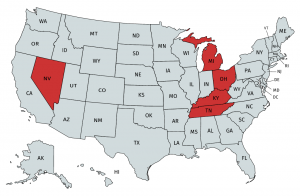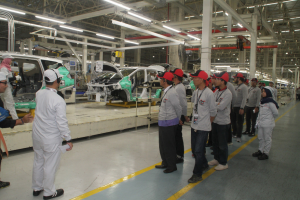Interpreting in the U.S. #6 – What Agents Want
Let me preface this article with a cultural difference:
When you work as an interpreter in Japan, agencies are a big part of what you do. However, in the US, agencies are far less common. There are very few “big name” agencies and freelancers prefer to focus on getting direct clients. California based conference interpreter and JACI member Junko Bradley touches on this difference in her very well written blog about the differences between interpreting in Japan and the US. Despite this fact, all interpreters must eventually work with an agency in their career. So, I would like to spend this article talking about what they want from us and how we can work with them better.
In writing this article, I interviewed staff from agencies around the US. Some specialized solely in Japanese-English interpreting. Others were general language service providers who work with a variety of languages. I asked them to candidly share their thoughts, their struggles, and all their trade secrets. They only were willing to give me the first two, but you can’t blame me for trying.
Who do agencies want?
 Obviously, agencies want experienced interpreters. Depending on the company, that means anywhere from 2 to 5 years minimum work experience. Some agencies even specify that the experience be in simultaneous since there are freelance interpreters out there who only do consecutive. In addition, all agencies require their interpreters to take some kind of test. This can be a simple spoken language evaluation or an interpreting test*. Sometimes, they also test sight translation abilities. If a potential interpreter doesn’t meet the minimum work experience requirement but has a Master’s Degree in interpreting, some agencies will allow that individual to take a test to get in. Otherwise, you will need to get a little experience working in-house before you can register with an agency. In addition to experience, some agencies want you to have professional training before they will register you. This is not always feasible in the J<>E pair because of the limited training opportunities in the U.S.. Therefore, if you are working with an agency in the U.S. that does not usually deal with Japanese interpreters, try to explain any relevant training you may have done on-the-job or in workshops.
Obviously, agencies want experienced interpreters. Depending on the company, that means anywhere from 2 to 5 years minimum work experience. Some agencies even specify that the experience be in simultaneous since there are freelance interpreters out there who only do consecutive. In addition, all agencies require their interpreters to take some kind of test. This can be a simple spoken language evaluation or an interpreting test*. Sometimes, they also test sight translation abilities. If a potential interpreter doesn’t meet the minimum work experience requirement but has a Master’s Degree in interpreting, some agencies will allow that individual to take a test to get in. Otherwise, you will need to get a little experience working in-house before you can register with an agency. In addition to experience, some agencies want you to have professional training before they will register you. This is not always feasible in the J<>E pair because of the limited training opportunities in the U.S.. Therefore, if you are working with an agency in the U.S. that does not usually deal with Japanese interpreters, try to explain any relevant training you may have done on-the-job or in workshops.
*From my personal experience: Of the three agencies I have worked with, only one required me to take a test. The other two placed me in a job simply based on my resume. So, while this is what agencies are saying, I have experienced something quite different.
Where do they need us?
The greatest need for Japanese interpreters is in the manufacturing hub of the Midwest: Ohio, Michigan, Tennessee, and Kentucky. However, one agent also mentioned Nevada as this is where Tesla is based. Tesla has been working with Japanese battery suppliers to help improve their electric cars.
You will notice that I did not mention New York, DC, or San Francisco. There are certainly needs for conference interpreters in those areas. However, there is also a high supply of both seasoned interpreters and educated bilingual expats. Agents are struggling to provide interpreters for medium-term contracts (multiple weeks) in the middle of nowhere. These jobs include more traditional conference interpreter work such as site visits for investor relations or executive audits. Many US companies have partial or full Japanese ownership. When executives want to tour the facility or negotiate a new contract with a potential supplier, they look for an interpreter nearby. Due to the concentration of interpreters in major metropolitan areas, these parts of the Midwest are left mostly uncovered.
What do they need us to do?
The bulk of the work in the Midwest centers around the aforementioned site visits by executives, technology transfer from Japanese experts to local staff, and TV conferences to coordinate activities with a head office or satellite in Japan. Due to the time difference, these are usually early in the morning (5:00 – 8:00 am) or late at night (7:00 – 10:00 pm).
 Much, but not all, of the work is consecutive. When simultaneous is called for, it will almost always be panaguide style (or bidule). It often involves less than ideal interpreting environments such as walking through a plant with noisy equipment, standing outside in the mud on a farm, or rooms with terrible acoustics. The agencies try to prepare their interpreters for the kind of environments they will face, but they encourage everyone to be flexible and understand that not every job is ideal.
Much, but not all, of the work is consecutive. When simultaneous is called for, it will almost always be panaguide style (or bidule). It often involves less than ideal interpreting environments such as walking through a plant with noisy equipment, standing outside in the mud on a farm, or rooms with terrible acoustics. The agencies try to prepare their interpreters for the kind of environments they will face, but they encourage everyone to be flexible and understand that not every job is ideal.
What do they want us to improve?
When it came to this question, I was shocked by the kind of answers I heard from the agencies I interviewed. It seems that their interpreters are lacking in very basic professional skills. Here are some examples:
- Be on time.
- Don’t complain – either to your coordinator or worse, to your client!
- Don’t get emotional or overwhelmed in the meeting.
- Don’t be a diva or arrogant.
- Write business appropriate emails.
- Don’t pepper the coordinator with questions – decide what you want to say before emailing.
- Learn how to use Microsoft Office.
On the flip side, one agency had a very insightful suggestion. The interpreters they hired were often bilinguals with no training or those who had been trained once but never do professional development. They wanted their interpreters to be familiar with the interpreting industry. Get up to date with the latest trends and research. Constantly work to improve your skills and deepen your background knowledge. (Note to reader: You may feel like this is a no-brainer. Sadly, this kind of basic connection to the industry is not all that common among Japanese interpreters working in the US.)
Another agent mentioned that they have trouble with interpreters not cross-training in multiple fields. For example, one person may be very experienced as a community interpreter. However, when you put them in a room full of engineers, they might as well be a newbie. In this case, the “don’t be a diva” comment comes into play. The agent needs us to know what we don’t know and adapt to the situation. We have to be humble enough to learn the new discipline and not assume that what we did before will work in a different industry.
Finally, one agency asked that interpreters try to brush up translation skills as well. As we all know, these are two distinct skills. I have witness first hand someone who could speak in grammatical sentences when interpreting, but had no idea where to put a period or comma in a written sentence. Another example was a native English speaker who spoke excellent Japanese but had never learned to read kanji! Even if you are not one of these extreme examples, there are many medium-term assignments where the interpreter may be asked to translate a document when there are no meetings scheduled. In these situations, the agency needs confidence that their interpreter will provide a comprehensible translation.
The Takeaway
If you are starting work as a freelancer in the US, don’t expect to be in a booth in an ivory tower. Understand that the needs and working environments are very different from major cities in Japan. Your agent is trying to help you get work, but they can’t do that if you aren’t willing to be flexible. Try to be open to whatever comes your way, as long as it is not in violation of industry standards (like an all-day simul assignment by yourself). Lastly, don’t lose your connection to the profession. Your agent can tell if you aren’t doing CPD. It should be a matter of professional pride that we are not just bilinguals. We are trained interpreters who are actively working to maintain our skills. That is what sets us apart.
Want to hear more about the crazy things that agents go through? Check out 通訳会社コーディネーターの本音 series on the Japanese side of this page (for JACI members only).
Allyson Larimer
Allyson Larimer is a freelance conference interpreter based in the U.S. She worked for two Honda suppliers for 7 years doing in-house translation and interpretation before branching out on her own in 2017. She is dedicated to promoting training opportunities for translators and interpreters in the Midwestern states of the U.S. She founded and chairs the Midwest Activities Committee for JAT. Allyson holds a BA in International Studies with an East Asian focus and an MA in TESOL. Her Japanese language study began at age 16 when she was dreaming of becoming an animator. While that dream faded, she continued to study the language throughout her post graduate schooling. She did a short home-stay in Okinawa during high school and 2 half-year study abroad trips in college and graduate school (both in Aichi). Despite having a TESOL degree and Japanese proficiency, she did not end up working in Japan. During the economic downturn, she found an opportunity working for a U.S. based Japanese company and has continued down the interpreting path ever since.